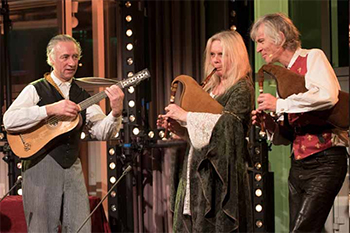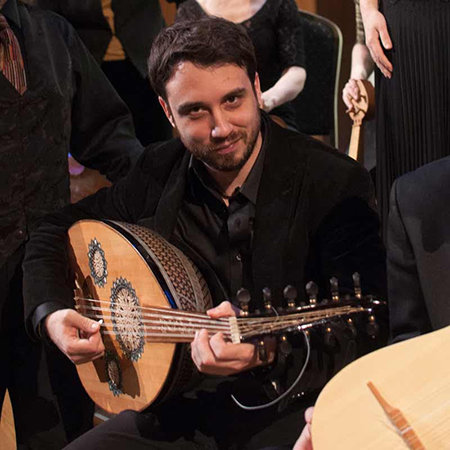by Daniel Hathaway

In a program planned via the Internet and email, Steven Player (guitar and dancer), Gesine Bänfer (bagpipes, cittern, recorders, and frame drums), and Ian Harrison (bagpipes, winds, and gothic harp) put their talents together with Amanda Powell (vocals), Brian Kay (plucked instruments and vocals), and Tina Bergmann (hammered dulcimer) to bring riddle ballads, earthy stories, and popular legends of Robin Hood and King Arthur vibrantly to life.
The afternoon began with I Have a Young Sister Far Beyond the Sea, which established the ethos of the program. Its text dates from the late Medieval Sloane Manuscript (ca. 1430), but the melody was collected in America in the 20th century. It belongs to the same riddle song genre as I gave my love a cherry (without any stone), and shares its tune with some German nursery rhymes.
Although early collectors of ballads were only interested in the texts, making it necessary to do some sleuthing to put tunes back with words that were often transmitted on printed broadsides at fairs and markets, Bänfer’s arrangement of I Have a Young Sister was based on a version sung by one Helen Hobart of Ohio, collected in 1930.
An Outlandish Knight, which the company staged very humorously — they’re equally fine actors as musicians — put a text published in Northumbria in 1882 together with a melody collected in Maine in 1907.
Some ballads were preserved in theatrical works, like The Willow Song quoted in Shakespeare’s Othello, performed on Sunday in an arrangement by Jeannette Sorrell based on Elizabethan manuscript sources.
In the second half of the program, the actor-musicians turned to ancient stories about Robin Hood and King Arthur, as well as a ballad inspired by historical events. Robin Hood and Little John, the tale of how those two characters met on a narrow bridge, was hilariously enacted by Harrison and Player.
The Four Marys told the sad tale of the ravishing of Mary Queen of Scots by the King and her abandonment of her baby at sea after failing to end her pregnancy with leaves from the juniper tree.
Outrageously acted out by Player and Harrison, The Marriage of Sir Gawain stretched the boundaries of modern political correctness with its characterization of women, but the ballad of King Arthur’s Death — in a battle accidentally launched by a knight who drew his sword to kill a snake — was tragic and poignant.
That “Far Beyond the Sea” only reached its final version during rehearsals in Cleveland was obvious from all the extra ballad texts in the printed program. If that was a bit confusing for the audience, it attested to the wealth of material the combined ensemble had to draw from. It would have been fun to be a fly on the wall while the show was being put together. The results were fresh and spontaneous, the music-making and text declamation splendid. Let’s hope these two groups find a way to conjoin their talents again in the future.
Published on ClevelandClassical.com June 13, 2019.
Click here for a printable copy of this article






